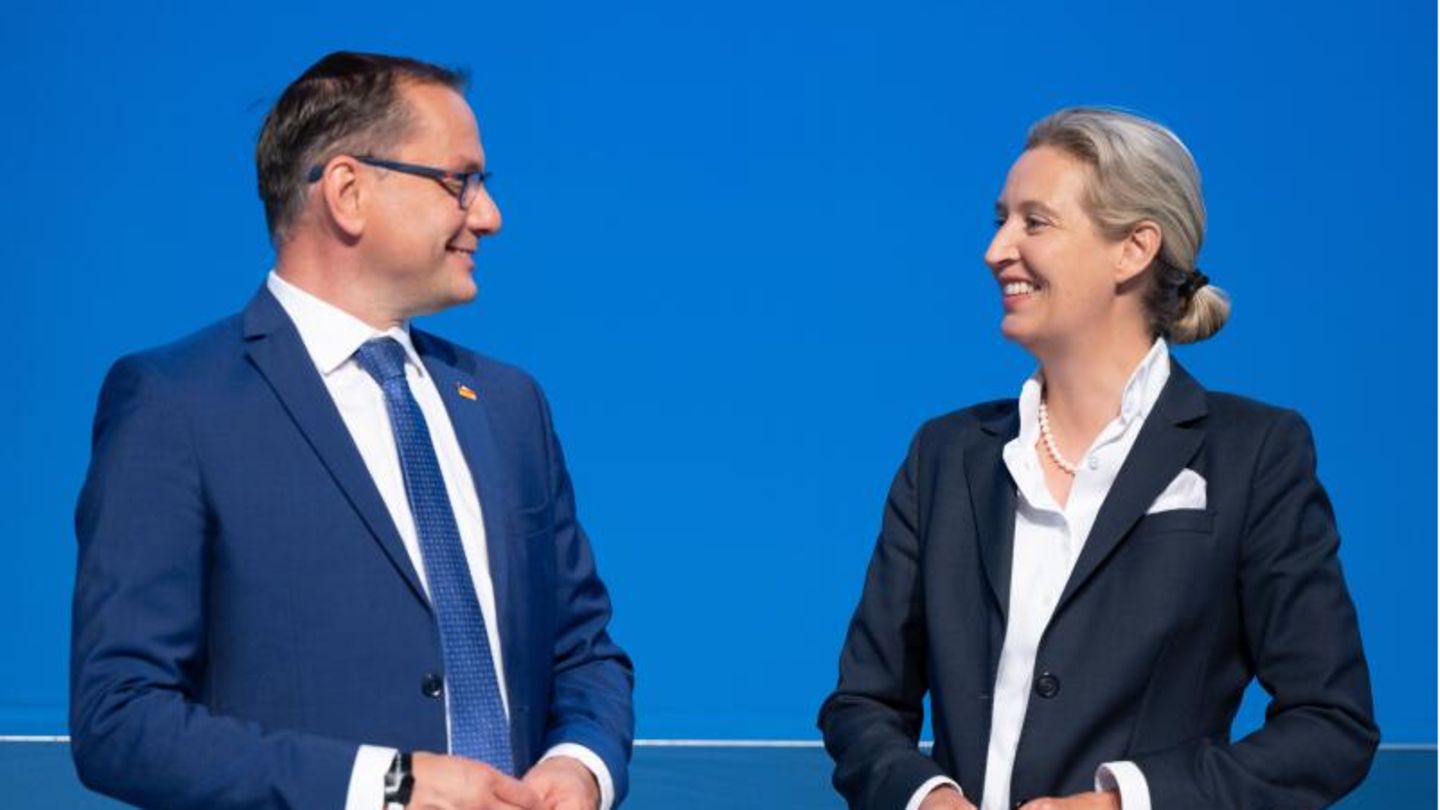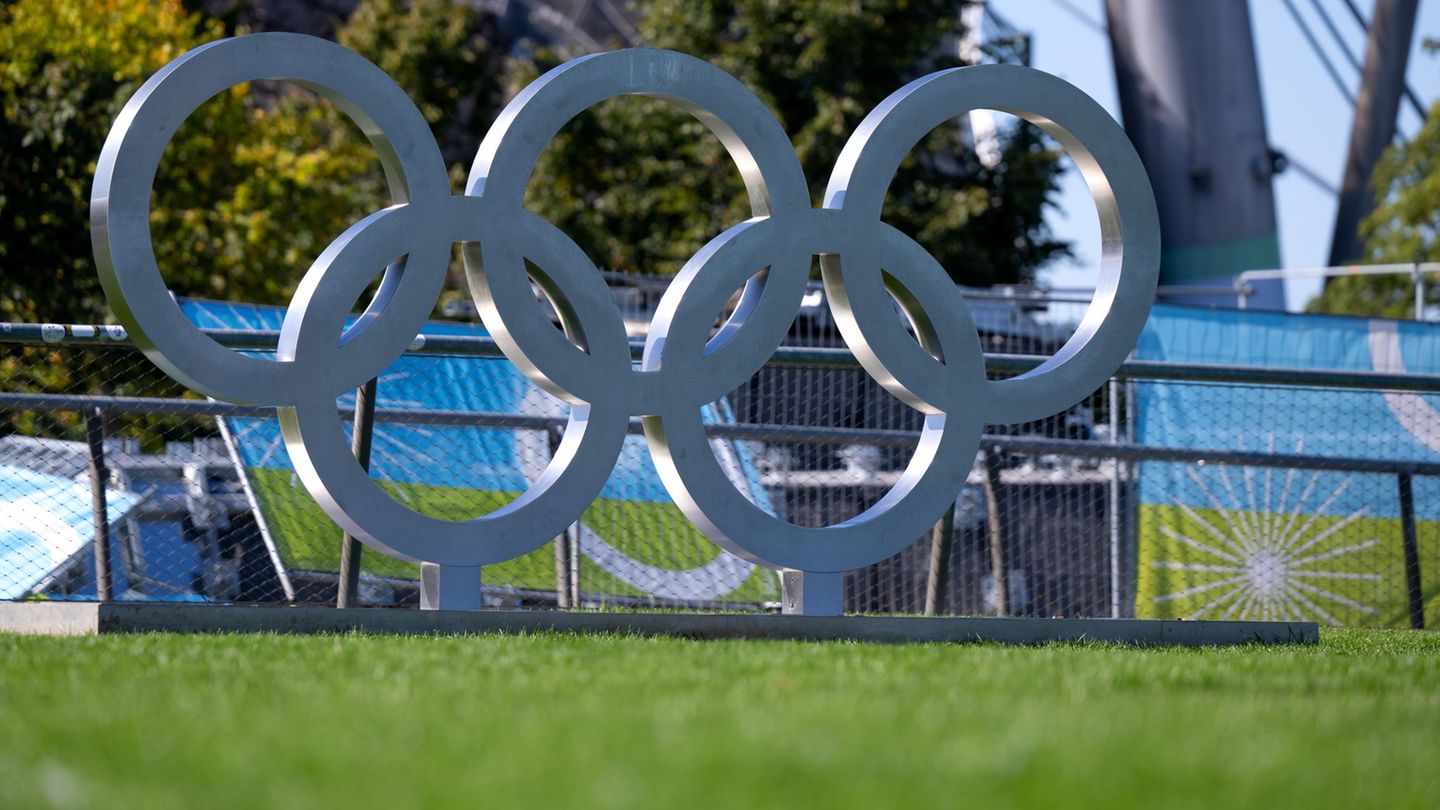The party conference in Riesa, Saxony, has decided: Tino Chrupalla remains party leader of the AfD, Alice Weidel moves up to co-chair with equal rights. The two had already led the parliamentary group together.
Tino Chrupalla and Alice Weidel will be joint leaders of the AfD in the future. At the federal party conference in Riesa, Saxony, a relatively narrow majority (53.4 percent) voted on Saturday to leave Chrupalla in office for another two years. Weidel moves up from deputy party leader to the position of co-spokeswoman with equal rights. She received 67.3 percent of the votes. Together, the duo now leads both the parliamentary group and the federal party. Perhaps also to show that they can work together smoothly, Weidel and Chrupalla proposed each other as candidates for the top post.
Chrupalla received 287 out of 538 votes cast. His opponent Norbert Kleinwächter got 195 votes (36.3 percent) – a respectable success for the representative of the more moderate camp. 55 delegates voted against both candidates. There was one abstention.
360 of 538 delegates voted for Weidel. 111 delegates (20.8 percent) voted for their opponent, MEP Nicolaus Fest. 64 voters voted against both candidates, three abstained.
Björn Höcke had campaigned for individual leadership
The delegates had changed the statutes of the AfD on Friday, so that theoretically an individual leadership is also possible in the future. The Thuringian head of state and party right winger Björn Höcke had campaigned for this. However, the party congress voted on Saturday to leave it at a dual leadership this time.
At the delegates’ meeting, which lasts until Sunday, the entire federal executive board, which last comprised 13 members, will be reassigned. This also decides on the future course of the AfD – depending on how many representatives of the respective party current can secure a post in the body.
Internal party criticism: “Away from the Angry Citizens’ Party”
Chrupalla has been at the helm since November 2019. In his first election at the party congress in Braunschweig at the time, he got 54.5 percent of the votes. The master craftsman from Saxony led the AfD alone after the departure of ex-co-boss Jörg Meuthen. Meuthen had certified the AfD an increasingly radical course. The Office for the Protection of the Constitution classified the party as a suspected right-wing extremist.
Critics within the party, who consider themselves to be in the moderate camp, openly attacked the party leader after the recent loss of votes in several state elections and accused him, among other things, of not being able to score points in the West. You have to “get away from the angry citizens’ party”. They also criticize Chrupalla’s course as being too pro-Russian and associate it with leaving the party.
Chrupalla promotes the demarcation of Union and FDP
Chrupalla’s opponent, Kleinwächter, said in his application speech that “we urgently need to get out of the low we’re in.” He advocated professionalism, unity, discipline and a new style of external communication and insisted on a “liberal-conservative” course for the AfD. “We actually represent the majority of the population in our country. They just don’t know it and we have to inform them about it.” As a representative of the moderate current, he achieved respectable success at the party congress.
Chrupalla campaigned for differentiation from the Union and the FDP. “We want to make the CDU and FDP superfluous,” he said. CDU party leader Friedrich Merz is a “green wolf in black sheep’s clothing.” The AfD does not participate in “vaccination, war and open borders”. According to his own statements, the 47-year-old wants to lead the AfD on a “free and social” course in the next two years.
Alice Weidel calls for more unity in the party
With a view to the loss of votes in the past state elections, Weidel appealed to the delegates: “Let’s not let every setback pull us down.” She called for more unity and said: “Let’s stop the unfounded accusations in public.” The AfD is not a discontinued model. “The AfD is the party of the future”. Weidel called the party the “necessary corrective in the encrusted party landscape”. Her challenger Fest promoted more inner-party harmony. He lamented what he called the unnecessary “permanent shelling” of elected party officials.
Weidel’s opponent Fest criticized in his application speech that there was “constant hacking and rushing” in the AfD’s social media. “Many voters are turning away, they are frustrated and discouraged,” said the MEP. A “party that is so internally torn” will not be elected, he said with a view to the sometimes significant losses for the AfD in the past elections.
Source: Stern
David William is a talented author who has made a name for himself in the world of writing. He is a professional author who writes on a wide range of topics, from general interest to opinion news. David is currently working as a writer at 24 hours worlds where he brings his unique perspective and in-depth research to his articles, making them both informative and engaging.




